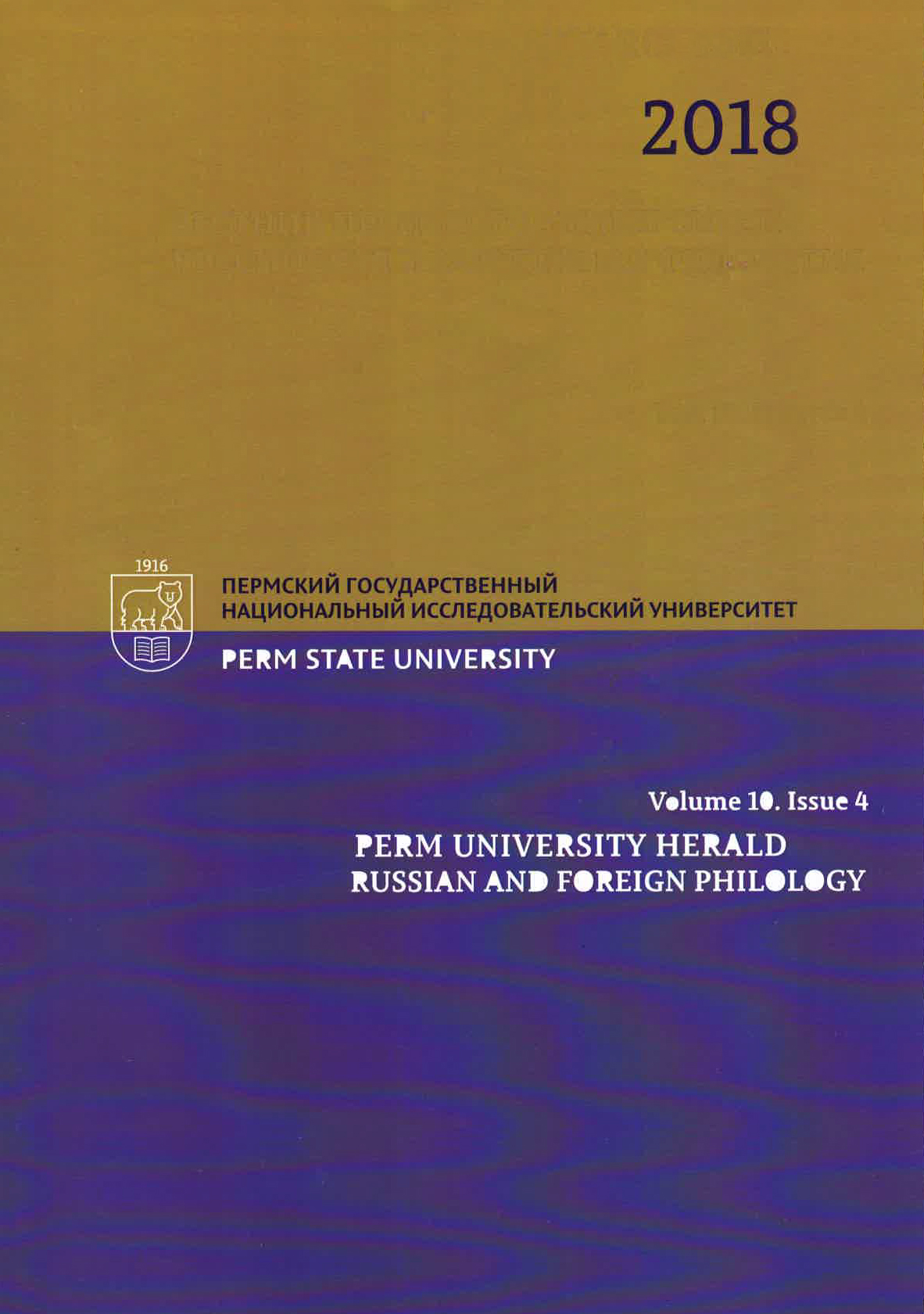CONTINUANTS OF THE PRE-SLAVIC *BЪDR- IN RUSSIAN DIALECTS: SEMANTIC AND MOTIVATIONAL INTERPRETATION
DOI:
https://doi.org/10.17072/2037-6681-2018-4-43-52Keywords:
Russian dialect vocabulary, semantics, motivation, ethnolinguistics, etymological and morphological word family.Abstract
The present article deals with Russian dialect words originating from the root *bъdr-. The material is analyzed in terms of motivational relationships between lexemes within the word family. The study shows that the key idea, which was an original one for the semantic development of the words from the root *bъdr- and is contained in the etymological meaning of the pre-Slavic root, is the idea of vital energy, force, activity. The article also refers to some lexemes which were formed during the further derivation inside the word family. The scope of meanings include emotions, objects, qualities, general appraisal, physical and psychological characteristics, behavior, different non-specialized actions. The continuants of the semantically related roots *vesel- and *dobr- are compared with the root in question. This comparison gives grounds for corroboration of some motivational models, as well as allows us to make some conclusions about the development of semantics of vital force plenitude in Russian dialects. For example, continuants of *vesel- and *bъdr- are traced in the nominations of good mood, high speed of action and process of fermentation. The resemblance of *dobr- and *bъdr- can be noted in general positive assessment, good quality, health and vegetative force. The author pays particular attention to the semantic and motivational peculiarities of the verb bódritsya ‘to neglect hospitality, to be squeamish about food’, and the adjective bódryy ‘about a person who refuses to eat, neglecting the hospitality’ (the Vologda region). The attention to these lexemes is due to their importance for ordinary folk: squeamishness and refusal to eat are regarded as disrespect towards the hosts, a sign of arrogance.References
Березович Е. Л. Русская лексика на общеславянском фоне: семантико-мотивационная реконструкция. М.: Русский фонд содействия образованию и науке, 2014. 488 с.
Бобрик М. А., Калугин Д. Я. «Бодрый наш народ»: семантика бодрости в контексте русской национальной идеи // Труды Института русского языка им. В. В. Виноградова. Вып. 9: История русского языка и культуры. Памяти В. М. Живова / гл. ред. А. М. Молдован; отв. ред. вып. А. А. Пичхадзе, Ю. В. Кагарлицкий. М.: Ин-т рус. яз. им. В. В. Виноградова РАН, 2016. С. 340–357.
Кабакова Г. И. Концепт чести в ритуале гостеприимства // Etnolingwistyka: Problemy języka i kultury. Lublin, 2013. № 25. S. 17–28.
Кузнецова О. А. Лексико-семантическое поле «Гордость»: мотивационно-генетический аспект: дис. … канд. филол. наук. Томск: 2015. 359 с.
Леонтьева Т. В. Социорегуляция приема пищи в зеркале русской диалектной лексики // Язык и культура. 2012. № 2. С. 27–43.
Малькова Я. В. Мотивационное своеобразие русской диалектной лексики со значениями ‘брезговать’, ‘гнушаться’, ‘пренебрегать’ // Научный диалог. 2016. № 2(50). С. 89–101.
Толстая С. М. Пространство слова. Лексическая семантика в общеславянской перспективе. М.: Индрик, 2008. 528 с.
Толстой Н. И. Веселье // Славянские древности: этнолингв. словарь: в 5 т. / под ред. Н. И. Толстого. М.: Междунар. отн., 1995. Т. 1. С. 346–348.
References
Berezovich E. L. Russkaya leksika na obshcheslavyanskom fone: semantiko-motivatsionnaya rekonstruktsiya [Russian vocabulary in the general Slavic context: semantic and motivational reconstruction]. Moscow, Russian Foundation for Education and Science Publ., 2014. 488 p. (In Russ.)
Bobrik M. A., Kalugin D. Ya. ‘Bodryy nash narod’: semantika bodrosti v kontekste russkoy natsional’noy idei [‘Our Cheerful People’: Semantics of cheerfulness in the context of the Russian national idea]. Trudy Instituta russkogo yazyka im. V. V. Vinogradova. Vyp. 9. Istoriya russkogo yazyka i kul’tury. Pamyati V. M. Zhivova [Proceedings of the V. V. Vinogradov Russian Language Institute. Vol. 9. History of the Russian Language and Cul-ture. In memoriam Viktor M. Zhivov]. Ed. by A. M. Moldovan, A. A. Pichkhadze, Yu. V. Kagarlitskiy. Moscow, V. V. Vinogradov Russian Language Institute of the Russian Academy of Sciences Publ., 2016, pp. 340–357. (In Russ.)
Kabakova G. I. Kontsept chesti v rituale gostepriimstva [The Russian concept of ČEST’ in the ritual of receiving guests]. Etnolingwistyka: Problemy języka i kultury [Ethnolinguistics. Prob-lems of Language and Culture], 2013, issue 25, pp. 17–28. (In Russ.)
Kuznetsova O. A. Leksiko-semanticheskoye pole «Gordost’» motivatsionno-geneticheskiy aspekt. Diss. kand. filol. nauk [Lexical-semantical field ‘Pride’, motivational and genetic aspects. Cand. philol. sci. diss.]. Tomsk, 2015. 359 p. (In Russ.)
Leont’eva T. V. Sotsioregulyatsiya priema pishchi v zerkale russkoy dialektnoy leksiki [Social Regulations of Eating Through the Prism of Russian Dialect Vocabulary]. Yazyk i kul’tura [Language and Culture], 2012, issue 2, pp. 27–43. (In Russ.)
Mal’kova Ya. V. Motivatsionnoe svoeobrazie russkoy dialektnoy leksiki so znacheniyami ‘brezgovat’, ‘gnushat’sya’, ‘prenebregat’ [Motiva-tional Peculiarity of Russian Dialect Lexis with Meanings ‘to Be Fastidious’, ‘to Shrink’, ‘to Dis-dain’]. Nauchnyy dialog [Scientific Dialogue], 2016, issue 2 (50), pp. 89–101. (In Russ.)
Tolstaya S. M. Prostranstvo slova. Leksicheskaya semantika v obshcheslavyanskoy perspective [The Space of a Word. Lexical Semantics in General Slavic Perspectives]. Moscow, Indrik Publ., 2008. 528 p. (In Russ.)
Tolstoy N. I. Vesel’e [Fun]. Slavyanskie drevnosti: etnolingvisticheskiy slovar’ [Slavic antiquities: The ethnolinguistic dictionary]. Moscow, International Relations Publ., 1995, vol. 1, pp. 346–348. (In Russ.)




